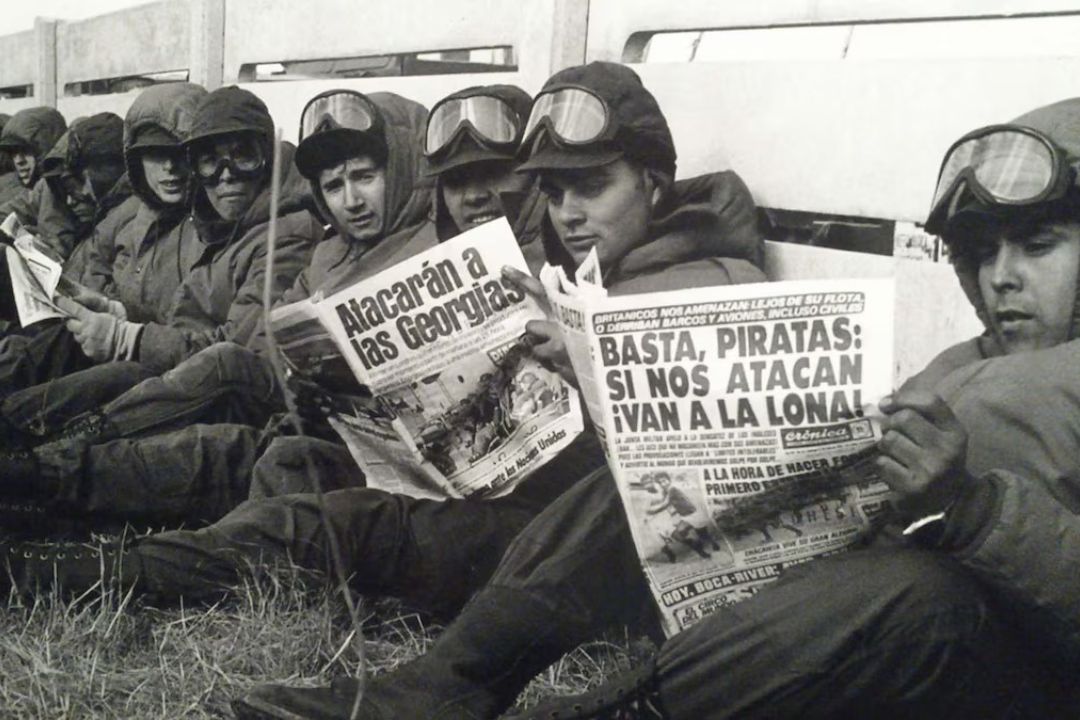Automatically Translated by AI
By: Alberto Giovanelli
April 2 once again, and as happens year after year, the historical memory after 43 years of the Malvinas War challenges us to draw multiple conclusions from what happened and deepen debates that acquire great relevance among revolutionaries, since the world is still crossed by wars and attacks of imperialist and oppressive countries against semi-colonial or oppressed countries: Ukraine and Palestine, for example.
It is necessary for us to reflect over and over again how to confront and defeat imperialism. We believe it is very useful to take into account past facts and their teachings.
The military dictatorship of 1976 was going through a very deep crisis: its economic plan had exploded two years earlier, it was losing support from the middle sectors and there was a growing workers’ and popular resistance that was added to the one initiated previous years by the always remembered Mothers of Plaza de Mayo. In that context, that military action was a political maneuver to hide the deep crisis of the regime, gain prestige and popular support by carrying out a claim deeply felt by the Argentine people. To take it forward, Galtieri absurdly assessed that it would be a “low cost” action since, being a territory of little economic and geopolitical value, Great Britain would not respond attack. In addition, he trusted that the US government (headed by Ronald Reagan) would “let the invasion run” in “gratitude” to the assistance that the Argentine military had provided in the repression and counterrevolution in multiple Latin American countries with the alledged coverage of the TIAR (Inter-American Treaty of Reciprocal Assistance).
Margaret Thatcher, whose government had been weak since birth, however, took advantage of this action to try to strengthen herself and sent a powerful naval force. Ronald Reagan obviously backed her, providing logistical, technical support, and resupply bases. They wanted to send a clear message to the world: imperialism and its possessions are not to be trifled with.
The Catholic Church was also aligned with them. They launched a hypocritical call “for peace” which real content was to promote Argentina’s surrender. Even the Pope, John Paul II, made a whirlwind trip to Argentina to participate in a great Mass-act, a few days before the surrender.
In the meantime, the call to support the recovery of the Malvinas turned into an overflowing anti-imperialist popular mobilization that cracked the dictatorial control of the country: the military had opened an oulet that would lead to the end of the dictatorship. Trapped between an anti-imperialist war that they did not want, on the one hand, and mass mobilization, on the other, the vast majority of the Argentine bourgeoisie and its political parties (from the Justicialist Party to Alfonsín Radicalism) together with the high military commanders began to work for the Argentine defeat.

Malvinas and a global debate
This war generated, and still generates, intense polemics within the Argentine and global left. What attitude should be adopted in the face of this action of a dictatorial regime? Which was more important: the anti-imperialist struggle or repudiating the regime? Should we have adopted a neutral position?
The PST (Socialist Workers’ Party), the predecessor party to the MST, had no doubts and oriented itself according to the teachings of Leon Trotsky, who had clearly pointed out that in the hypothesis of war between a semi-fascist, semi-colonial regime and a “democratic” imperialist power, revolutionaries should, without hesitation, be part of the “military camp” of the semi-colonial country.
Also for Lenin, the position in front of the war and its outcome did not depend on the type of leadership that an specific struggle had in the oppressed country but on the character of the countries in conflict. In this case, the socialists “had to defend the homeland” of the oppressed country and position themselves in its military field. This was, for him, the central and common criteria for the socialist revolution: “Socialists cannot achieve their lofty goal without fighting against all oppression of nations.”
This is how, once war was declared, revolutionary socialists placed ourselves in the front line of combat occupying a place in the anti-imperialist military camp and, together with the vast majority of the Argentine people, we played all our forces for the triumph. Similarly, after the Argentine defeat, the PST was on the streets promoting the mobilizations that gave the final blow to the dictatorship.
During the war, there was also great support from many Latin American peoples, as an example of this in Peru, Mexico, Colombia and Venezuela, dock workers initiated a boycott of British ships and on May 12, in Lima, an impressive four-kilometer mobilization marched to San Martín Square, convened by the Peruvian Argentine Solidarity Committee.
The controversy with the Left
While the Argentine PST defended and promoted a very clear revolutionary policy, a large part of the Argentine and world left (including currents that claimed to be Leninist and Trotskyist) chose the wrong paths: they oscillated between shameful support for Great Britain and a pacifist policy of “neutrality” that, in practice, served imperialism.
For example, the USFI (Unified Secretariat of the Fourth International) issued on April 12 a statement by the Trotskyist International Liaison Committee that, in its point 5, states: “In doing so the Argentine dictators have trampled upon the rights of the Falkland inhabitants, who in themselves oppress and threaten no one and should have the right to decide their own future. (…) We do not support this action and call for the withdrawal of Argentine troops.”
In other words, it claimed the right to self-determination of the inhabitants of the Malvinas against Argentina. Interestly enough, 40 years later, it is the same position that Milei’s proto-fascist government upholds. This stand was based on a falsification: the Malvinas inhabitants (the Kelpers) are not a nationality of a colonial possession dominated by imperialism who are fighting for their independence.Malvinas is an imperialist enclave: that is to say, a territory of another nation appropriated by a foreign power, on which it artificially settles a population brought from the usurping power. Because of this situation, this population will always struggle to remain part of it. It is the same situation that occurs in Gibraltar, usurped by England from Spain.
Also the main English currents that claim to be Trotskyists gave in to the European, and their own imperialism, “democratizing” pressures and were centrally located denouncing the “Argentine dictatorship” with different arguments, but that mainly ended up justifying Thatcher’s military response.
Although they never came to affirm it directly, the logical conclusion of these analyses and this policy was to shamefully support and military action unity with Great Britain.
For its part, the Trotskyist current headed by Pierre Lambert, whose main party was the French PCI (Internationalist Communist Party) adopted a “neutralist” position.
Política Obrera in Argentina (currently Gabriel Solano’s Partido obrero and Jorge Altamira’s Política Obrera) oscillated, as indicated by its entire political trajectory, from abstention in the first days after April 2nd to self-proclaimed apparatism, calling to participate in the marches that the Pope called for in the middle of the war “for peace”, with the utopian objective of “changing the content of those demonstrations”, acting as a left-wing group, to thecall that objectively was a call to surrender to Thatcher and imperialism.
Can imperialism be defeated?
During the war, a large part of the Argentine bourgeoisie and its media launched a strong defeatist campaign that Malvinas was “an absurd war”, because it was impossible to defeat imperialism. Even a sector of the vanguard and the mass movement came to the same conclusion: “You can’t beat imperialism,” due to its military and economic superiority. However, from the ISL and the MST we state that a triumph was totally possible and that it was the disastrous political-military conduct of the dictatorship that prevented it from happenning.
As an example, we can mention that the Argentine military government had the opportunity to increase its air and combat military capacity at sea since several countries offered it aircraft and other supplies. It was the case of Peru, which sent 10 aircraft units, which were accepted; the Fidel Castro’s Cuban Government offered a submarine (which was rejected), while the Libyan government offered planes, pilots and missiles.
War also revived in the Latin American peoples a strong anti-imperialist feeling that led them to support Argentina. It was proposed that this hypothesis would turn into a Latin American anti-imperialist war against the United States.
This leads us to another deeper consideration: although it is a very important factor, military superiority does not always define the course of a war, because political factors enter into it, as a key element. If military superiority is considered in isolation, imperialism would be invincible. However, history shows that it has been defeated several times in wars against weaker nations when it had to face vigorous national resistance and, many times, mobilizations against the war in the imperialist country itself. For example, this happened in the Vietnam War, and also in the wars in Iraq and Afghanistan, all of which ended with imperialist defeat. Even at the cost of suffering and sacrifices, imperialism can be defeated militarily and politically by weaker nations.
The Argentine military Government did not take a single political-economic measure against imperialism, such as stopping paying the foreign debt or expropriating the companies, banks and industries that England and the United States owned in the country. Nor did they take advantage of the mobilizations and the support he received on the continent to encourage other governments to take similar measures or to form brigades of Latin American fighters to fight on the Argentine side. Both courses of action would have been central factors that would have helped an Argentine triumph.
Some final considerations
We remember and analyze the Malvinas War not only as a historical fact but also because of its teachings. First of all, as we have seen, because of the real existing possibility of defeating imperialism. The policy of the bourgeoisie to “demalvinize” responds to the objective of erasing from the memory of the workers and the people that feeling of anti-imperialist struggle. However, every time, in a football stadium, a concert or a mobilization, “whoever does not jump is British” is sung. Evidently, they are very far from being able to erase anti-imperialism.
Secondly, because we must warn and distance ourselves from the same (or similar) reasoning mechanisms that led organizations that claim to be Trotskyist to wrong characterizations and policies in the Malvinas war and that they now repeat in the face of the Ukrainian war, for example.
We therefore ratify a consistently anti-imperialist policy that constitutes the solid foundations in the construction of an international, revolutionary current and for socialism like the one we are building from the International Socialist League.





